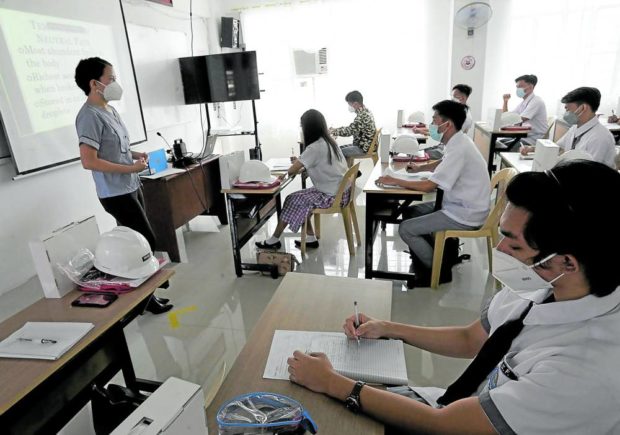Some schools to close in 2 months if ‘no permit, no exam’ ban is imposed – PACU

FACE TO FACE A class of Grade 12 senior high school students at Sen. Renato “Compañero” Cayetano Memorial Science and Technology High School in Taguig City simulate a face-to-face class in general biology led by their teacher Jermaine San Agustin in this Dec. 2. 2021 file photo. (INQUIRER photo)
MANILA, Philippines— If a ban on “no permit, no exam” policy will be implemented, some schools will be able keep running only in the next two months once the new system is put into place.
This is the result of the study conducted by the Philippine Association of Colleges and Universities (PACU) in reaction to House Bill number 7584.
The measure seeks to prohibit educational institutions from implementing a rule that prevents students from taking tests if they have not been able to pay school fees.
The Coordinating Council of Private Educational Associations (Cocopea) is using this outcome as the basis for its opposition to the bill.
“Colleges and universities would run out of operating cash and would need to find external or other sources of financing (such as loans or savings) to cover their costs,” said Cocopea Chairperson Bernard Villamor.
This is a huge blow from the average of 7.7 months of operating expenses the study’s 27 respondent schools are able to cover with current fees.”
Cocopea maintained private schools must be able to demand prompt payment of tuition, saying this practice is necessary to keep the institutions alive as the payments directly go towards capital expenditures and operating costs.
The chairperson also cited a study by the Catholic Educational Association of the Philippines (CEAP) in which 49 percent of its 224 basic education school respondents revealed that they are already at a loss financially or are only breaking even with its current fee collections.
The same is true for 64.2 percent of 53 colleges and universities respondents, according to the CEAP study.
“These schools will be most financially at risk with the ‘No Permit, No Exam’ bill,” he said.
Smaller schools more vulnerable
Villamor pointed out that the policy may “have adverse effects on the viability” of private schools, eventually resulting in their closures.
He said that small schools, mission schools, and parochial schools, among others of a similar size, would be more vulnerable to this as they rely heavily on prompt payment of fees.
“Displaced students will likely transfer to public schools, which are already overwhelmed by the number of students who transferred due to the pandemic,” he added.
The Commission on Higher Education (CHEd) reported on May 11 that state universities and colleges have demanded over P2 billion in collectible supplemental funds due to the enrollment spike triggered by the COVID-19 pandemic.
Safeguards not enough
While HB No. 7584 includes safeguards to incentivize payments such as non-readmission in the next school year or semester, withholding of grades, certificates, diplomas, or other credentials and clearances, and resorting to court action, Villamor asserted that these might not be adequate.
“These do not directly address the issue of operational costs and are actually being done together already at present with any NPNE (No permit, no exam) requirements. These are reactionary measures that can be resorted to only after operational expenses have been incurred,” he added.
Respectfully, there must be proactive or preventive measures that will ensure that the operational costs of private schools do not accumulate to the point that they are unable to sustain operations,” Villamor added.
RELATED STORIES:
Private schools send out SOS to gov’t: Raise student subsidy
House panel OKs bill banning ‘no permit, no exam’ rule in primary, secondary schools